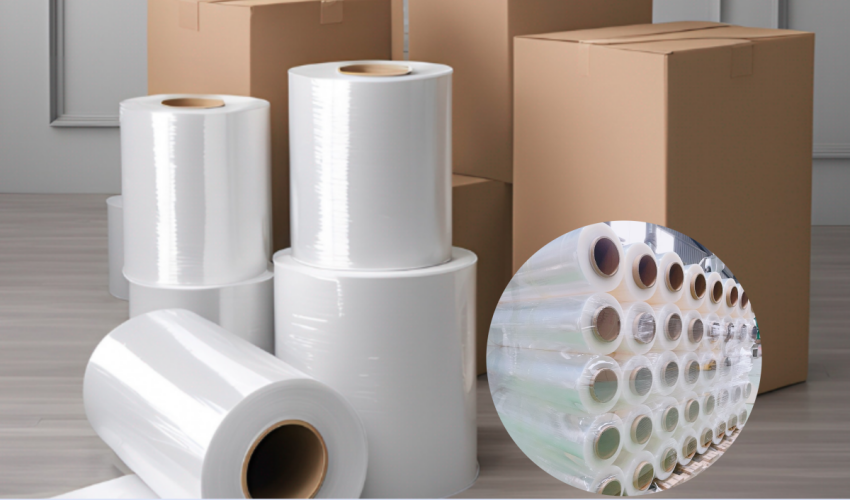
Traditional pallet wrap is widely used in logistics to secure pallet loads during transportation, ensuring goods remain stable and protected throughout the supply chain. However, the environmental impact of conventional plastic pallet wraps has become a growing concern. Single-use plastic waste from these wraps contributes significantly to pollution and landfill issues. As a result, many companies are now seeking more sustainable alternatives. The rise of biodegradable pallet wrap marks a key shift towards eco-friendly packaging solutions. By using biodegradable materials that break down naturally, businesses can reduce their environmental footprint. As sustainability becomes a priority in modern supply chains, the transition to biodegradable pallet wrap helps companies meet green initiatives while maintaining efficiency in logistics and packaging.
What Is Degradable Pallet Wrap From? When choosing a biodegradable pallet wrap, businesses must consider several performance factors to ensure they get a product that meets their operational needs. The primary qualities to look for in high-quality biodegradable pallet wrap include:
Biodegradable pallet wrap designed for industrial use must be capable of withstanding the demanding conditions typical of large-scale operations. Some of the key features of industrial-grade biodegradable pallet wraps include:
Biodegradable pallet wrap is widely used across various stages of the logistics and freight industry. Its primary function is to secure and stabilize products on pallets during transportation. By providing a secure outer layer, biodegradable pallet wrap prevents items from shifting, toppling, or sustaining damage during movement across the supply chain.
Both small and large businesses are increasingly adopting biodegradable pallet wrap to meet sustainability goals and improve their environmental footprint.
In industrial settings, the application of biodegradable pallet wrap is essential for securing bulk items and ensuring they arrive at their destination safely. From warehouses to factories to shipping companies, the demand for environmentally friendly packaging is growing, and biodegradable pallet wrap is playing a key role in this transformation.
When comparing biodegradable pallet wrap to traditional plastic wrap, the most significant difference lies in environmental impact. Traditional plastic wrap, while effective in securing and stabilizing goods, is made from petroleum-based materials that are non-biodegradable. This results in long-lasting waste that can take hundreds of years to break down in landfills, contributing to the growing issue of plastic pollution. In contrast, biodegradable pallet wrap is similar to plastic free pallet wrap and offers a more sustainable and environmentally friendly solution, as it is made from renewable, biodegradable materials, reducing long-term environmental harm.
Another alternative to traditional plastic pallet wrap is paper pallet wrap. Made from recycled paper, this option offers a renewable, compostable solution for securing pallets during transportation. However, it is essential to consider the pros and cons when choosing between biodegradable pallet wrap and paper wrap.
Perforated pallet wrap is a type of biodegradable pallet wrap designed with small holes or perforations along the film. These perforations allow air to flow through the wrap, which can be beneficial in specific packaging scenarios where ventilation is required.
As the demand for eco-friendly packaging solutions grows, several manufacturers have emerged as leaders in providing high-quality biodegradable stretch films. These companies specialize in producing biodegradable pallet wrap that combines performance with sustainability, helping businesses make the transition to greener packaging solutions without sacrificing quality.
A biodegradable wrap is a type of packaging material designed to break down naturally over time when exposed to environmental conditions such as moisture, heat, or bacteria. Unlike traditional plastic wraps that can take centuries to decompose, biodegradable wraps are made from renewable resources like plant-based biopolymers or polymers with additives (such as D2W) that accelerate the degradation process. Biodegradable wraps are commonly used in industries like logistics, warehousing, and retail to secure and protect goods during transportation and storage. These wraps offer the same durability and stretchability as conventional plastic wraps but break down into organic matter after disposal, leaving no harmful microplastics behind. They are a sustainable alternative to plastic packaging and help businesses reduce their environmental impact while maintaining product security and integrity during transit. Biodegradable wraps can be used for a variety of applications, including pallet wrapping, product bundling, and even food packaging.
While pallet wrap (often made of stretch film) is the most commonly used material to secure products during transportation, several alternatives are available, depending on the type of product and shipping requirements.
Paper Pallet Wrap: An eco-friendly alternative, paper wrap is made from recycled materials and is biodegradable. It is typically used for lighter items and those that do not require extreme durability. While it offers sustainability benefits, it may not be as stretchable or resistant to moisture as plastic or biodegradable wraps.
Strapping: This involves using metal or plastic bands to secure products on a pallet. Strapping is especially useful for securing heavy loads and items that need rigid stabilization. However, it does not offer the same level of protection as wrap against dirt or moisture.
Stretch Hooding: A process where a shrink film is applied over a pallet using heat to create a tight, secure covering. Stretch hoods are highly durable, offering excellent protection during transit. However, they can be more expensive than traditional stretch wrap.
Reusable Pallet Covers: Made from materials such as fabric or plastic, reusable pallet covers can be used multiple times and are an environmentally friendly alternative to single-use wraps. These are ideal for protecting goods during shipping, especially when reused in a closed-loop system.
Corrugated Sheets: These can be used to cover and protect items on a pallet. It is particularly effective for smaller or fragile items and can be recycled after use.
Yes, biodegradable shrink wrap exists and is an eco-friendly alternative to traditional plastic shrink film. Just like standard shrink wrap, biodegradable shrink film is used to tightly secure products or pallets. However, the key difference is that it is made from renewable or biodegradable materials that allow it to decompose naturally after disposal. The most common materials used in biodegradable shrink wrap are plant-based polymers, such as PLA (polylactic acid), or biodegradable additives that accelerate the breakdown process. These films are used in a wide range of applications, including retail packaging, product bundling, and even food packaging. Biodegradable shrink wrap offers the same performance features as traditional plastic shrink film, such as clarity, stretchability, and puncture resistance, but it provides the added benefit of being environmentally friendly. When exposed to appropriate landfill or composting conditions, biodegradable shrink wrap breaks down into harmless substances like carbon dioxide, water, and biomass, reducing the environmental impact of plastic waste. For companies looking to reduce their plastic usage and adopt more sustainable practices, biodegradable shrink wrap is an excellent choice for packaging solutions that require heat sealing.
The recyclability of pallet wrap depends on the material it is made from. Traditional plastic pallet wrap, typically made from low-density polyethylene (LDPE), is technically recyclable, but the process can be challenging. Most curbside recycling programs do not accept plastic films like stretch wrap because they tend to jam machinery at recycling facilities. However, some specialized recycling centers accept these types of plastics, and many businesses have recycling programs in place to handle this waste. For pallet wrap to be recyclable, it should be clean and free from contaminants like adhesives or food residues. On the other hand, biodegradable pallet wrap is not suitable for conventional recycling processes. While it breaks down naturally in composting or landfill conditions, it is not designed to be recycled in the same way as plastic films. However, it provides the benefit of reducing long-term plastic waste, as it decomposes into organic material without leaving microplastics behind. Some biodegradable wraps can be disposed of through composting facilities that handle industrial composting, but it is important to check with local recycling or composting programs to understand the best disposal methods for biodegradable materials.

My name is James Thompson, and I’m the editor of this website dedicated to Stretch Film, Pallet Wrap, and Stretch Wrap products.
My passion for packaging began when I noticed the challenges companies face in securing their products efficiently for transportation and storage. This inspired me to delve deep into the world of stretch films and pallet wraps, exploring the latest technologies and best practices.
I aim to provide valuable insights, practical tips, and up-to-date industry trends to assist you in making informed decisions. Whether you’re a small business owner or part of a large corporation, my goal is to support you in optimizing your operations and ensuring your products reach their destination safely.
Thank you for visiting, and I look forward to accompanying you on your journey toward better packaging solutions.
Comments are closed